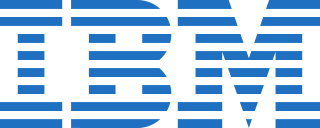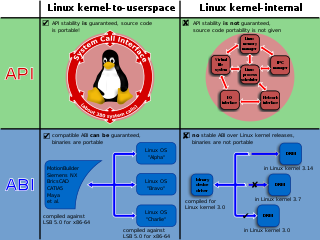
AIX is a series of proprietary Unix operating systems developed and sold by IBM for several of its computer platforms.
IBM mainframes are large computer systems produced by IBM since 1952. During the 1960s and 1970s, IBM dominated the computer market with the 7000 series and the later System/360, followed by the System/370. Current mainframe computers in IBM's line of business computers are developments of the basic design of the System/360.

Multiple Virtual Storage, more commonly called MVS, is the most commonly used operating system on the System/370, System/390 and IBM Z IBM mainframe computers. IBM developed MVS, along with OS/VS1 and SVS, as a successor to OS/360. It is unrelated to IBM's other mainframe operating system lines, e.g., VSE, VM, TPF.

An operating system (OS) is system software that manages computer hardware and software resources, and provides common services for computer programs.

VSEn is an operating system for IBM mainframe computers, the latest one in the DOS/360 lineage, which originated in 1965. It is less common than z/OS and is mostly used on smaller machines.

Hercules is a computer emulator allowing software written for IBM mainframe computers and for plug compatible mainframes to run on other types of computer hardware, notably on low-cost personal computers. Development started in 1999 by Roger Bowler, a mainframe systems programmer.

Computer operating systems (OSes) provide a set of functions needed and used by most application programs on a computer, and the links needed to control and synchronize computer hardware. On the first computers, with no operating system, every program needed the full hardware specification to run correctly and perform standard tasks, and its own drivers for peripheral devices like printers and punched paper card readers. The growing complexity of hardware and application programs eventually made operating systems a necessity for everyday use.

In computing, a system call is the programmatic way in which a computer program requests a service from the operating system on which it is executed. This may include hardware-related services, creation and execution of new processes, and communication with integral kernel services such as process scheduling. System calls provide an essential interface between a process and the operating system.
In computing, Interactive System Productivity Facility (ISPF) is a software product for many historic IBM mainframe operating systems and currently the z/OS and z/VM operating systems that run on IBM mainframes. It includes a screen editor, the user interface of which was emulated by some microcomputer editors sold commercially starting in the late 1980s, including SPF/PC.

Coherent is a clone of the Unix operating system for IBM PC compatibles and other microcomputers, developed and sold by the now-defunct Mark Williams Company (MWC). Historically, the operating system was a proprietary product, but it became open source in 2015, released under the BSD-3-Clause license.

VM is a family of IBM virtual machine operating systems used on IBM mainframes System/370, System/390, zSeries, System z and compatible systems, including the Hercules emulator for personal computers.

CP/CMS is a discontinued time-sharing operating system of the late 1960s and early 1970s. It is known for its excellent performance and advanced features. Among its three versions, CP-40/CMS was an important 'one-off' research system that established the CP/CMS virtual machine architecture. It was followed by CP-67/CMS, a reimplementation of CP-40/CMS for the IBM System/360-67, and the primary focus of this article. Finally, CP-370/CMS was a reimplementation of CP-67/CMS for the System/370. While it was never released as such, it became the foundation of IBM's VM/370 operating system, announced in 1972.

Windows NT 3.1 is the first major release of the Windows NT operating system developed by Microsoft, released on July 27, 1993.
A hypervisor, also known as a virtual machine monitor (VMM) or virtualizer, is a type of computer software, firmware or hardware that creates and runs virtual machines. A computer on which a hypervisor runs one or more virtual machines is called a host machine, and each virtual machine is called a guest machine. The hypervisor presents the guest operating systems with a virtual operating platform and manages the execution of the guest operating systems. Unlike an emulator, the guest executes most instructions on the native hardware. Multiple instances of a variety of operating systems may share the virtualized hardware resources: for example, Linux, Windows, and macOS instances can all run on a single physical x86 machine. This contrasts with operating-system–level virtualization, where all instances must share a single kernel, though the guest operating systems can differ in user space, such as different Linux distributions with the same kernel.
The IBM Basic assembly language and successors is a series of assembly languages and assemblers made for the IBM System/360 mainframe system and its successors through the IBM Z.
The following is a timeline of virtualization development. In computing, virtualization is the use of a computer to simulate another computer. Through virtualization, a host simulates a guest by exposing virtual hardware devices, which may be done through software or by allowing access to a physical device connected to the machine.

Operating System/Virtual Storage 1, or OS/VS1, is a discontinued IBM mainframe computer operating system designed to be run on IBM System/370 hardware. It was the successor to the Multiprogramming with a Fixed number of Tasks (MFT) option of System/360's operating system OS/360. OS/VS1, in comparison to its predecessor, supported virtual memory. OS/VS1 was generally available during the 1970s and 1980s, and it is no longer supported by IBM.
The history of IBM mainframe operating systems is significant within the history of mainframe operating systems, because of IBM's long-standing position as the world's largest hardware supplier of mainframe computers. IBM mainframes run operating systems supplied by IBM and by third parties.

OS/360, officially known as IBM System/360 Operating System, is a discontinued batch processing operating system developed by IBM for their then-new System/360 mainframe computer, announced in 1964; it was influenced by the earlier IBSYS/IBJOB and Input/Output Control System (IOCS) packages for the IBM 7090/7094 and even more so by the PR155 Operating System for the IBM 1410/7010 processors. It was one of the earliest operating systems to require the computer hardware to include at least one direct access storage device.










